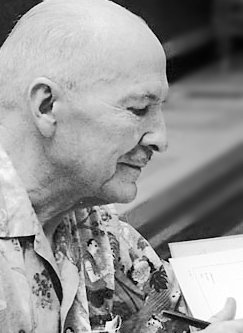
Robert Anson Heinlein was an American science fiction author, aeronautical engineer, and naval officer. Sometimes called the "dean of science fiction writers", he was among the first to emphasize scientific accuracy in his fiction, and was thus a pioneer of the subgenre of hard science fiction. His published works, both fiction and non-fiction, express admiration for competence and emphasize the value of critical thinking. His plots often posed provocative situations which challenged conventional social mores. His work continues to have an influence on the science-fiction genre, and on modern culture more generally.

Starship Troopers is a military science fiction novel by American writer Robert A. Heinlein. Written in a few weeks in reaction to the US suspending nuclear tests, the story was first published as a two-part serial in The Magazine of Fantasy & Science Fiction as Starship Soldier, and published as a book by G. P. Putnam's Sons on November 5, 1959.

Stranger in a Strange Land is a 1961 science fiction novel by American author Robert A. Heinlein. It tells the story of Valentine Michael Smith, a human who comes to Earth in early adulthood after being born on the planet Mars and raised by Martians, and explores his interaction with an eventual transformation of Terran culture.
"Life-Line" is a short story by American author Robert A. Heinlein. Published in the August 1939 edition of Astounding, it was Heinlein's first published short story.
"Misfit" is a science fiction short story by American writer Robert A. Heinlein. It was originally titled "Cosmic Construction Corps" before being renamed by the editor John W. Campbell and published in the November 1939 issue of Astounding Science Fiction. "Misfit" was Heinlein's second published story. One of the earliest of Heinlein's Future History stories, it was later included in the collections Revolt in 2100 and The Past Through Tomorrow.
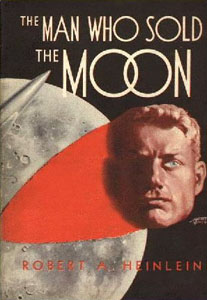
"The Man Who Sold the Moon" is a science fiction novella by American author Robert A. Heinlein, written in 1949 and published in 1950. A part of his Future History and prequel to "Requiem", it covers events around a fictional first Moon landing in 1978 and the schemes of Delos D. Harriman, a businessman who is determined to personally reach and control the Moon.
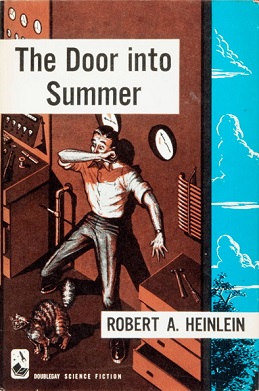
The Door into Summer is a science fiction novel by American science fiction writer Robert A. Heinlein, originally serialized in The Magazine of Fantasy & Science Fiction. It was published in hardcover in 1957.
Alexei Panshin was an American writer and science fiction critic. He wrote several critical works and several novels, including the 1968 Nebula Award–winning novel Rite of Passage and, with his wife Cory Panshin, the 1990 Hugo Award–winning study of science fiction The World Beyond the Hill.
In American science fiction of the 1950s and '60s, psionics was a proposed discipline that applied principles of engineering to the study of paranormal or psychic phenomena, such as extrasensory perception, telepathy and psychokinesis. The term is a blend word of psi and the -onics from electronics. The word "psionics" began as, and always remained, a term of art within the science fiction community and—despite the promotional efforts of editor John W. Campbell, Jr.—it never achieved general currency, even among academic parapsychologists. In the years after the term was coined in 1951, it became increasingly evident that no scientific evidence supports the existence of "psionic" abilities.
"The Man Who Traveled in Elephants" is a short story written in 1948 by Robert A. Heinlein. It was first published as "The Elephant Circuit" in the October 1957 issue of Saturn Magazine. It later appeared in two Heinlein anthologies, The Unpleasant Profession of Jonathan Hoag and The Fantasies of Robert A. Heinlein (1999).
Jubal Harshaw is a fictional character featured in several novels by Robert A. Heinlein, most prominently 1961's Stranger in a Strange Land. He is described as: "Jubal E. Harshaw, LL.B., M.D., Sc.D., bon vivant, gourmet, sybarite, popular author extraordinary, neo-pessimist philosopher, devout agnostic, professional clown, amateur subversive, and parasite by choice."
"Solution Unsatisfactory" is a 1941 science fiction short story by American writer Robert A. Heinlein. It describes the US effort to build a nuclear weapon in order to end the ongoing World War II, and its dystopian consequences to the nation and the world.
"Water is for Washing" is a science fiction short story by American writer Robert A. Heinlein, first published in Argosy. It is based on the premise that an earthquake had catastrophically shattered the range of alluvial deposits separating the Imperial Valley from the Gulf of California, precipitating a tsunami moving north to transiently drown these lowlands.
"Columbus Was a Dope" is a science fiction short story by American writer Robert A. Heinlein. It was first published in the May 1947 issue of Startling Stories. It later appeared in two of Heinlein's collections, The Menace from Earth (1959), and Off the Main Sequence: The Other Science Fiction Stories of Robert A. Heinlein (2005).
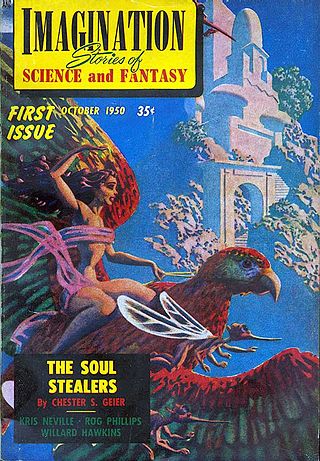
Imagination was an American fantasy and science fiction magazine first published in October 1950 by Raymond Palmer's Clark Publishing Company. The magazine was sold almost immediately to Greenleaf Publishing Company, owned by William Hamling, who published and edited it from the third issue, February 1951, for the rest of the magazine's life. Hamling launched a sister magazine, Imaginative Tales, in 1954; both ceased publication at the end of 1958 in the aftermath of major changes in US magazine distribution due to the liquidation of American News Company.
The Heinlein juveniles are the science-fiction novels written by Robert A. Heinlein for Scribner's young-adult line. Each features "a young male protagonist entering the adult world of conflict, decisions, and responsibilities." Together, they tell a loosely connected story of space exploration. Scribner's published the first 12 between 1947 and 1958, but rejected the 13th, Starship Troopers. That one was instead published by Putnam. A 14th novel, Podkayne of Mars, is sometimes listed as a "Heinlein juvenile", although Heinlein himself did not consider it to be one.
"Nothing Ever Happens on the Moon" is a science fiction short story by American writer Robert A. Heinlein, published in April and May 1949 in Boys' Life, a magazine of the Boy Scouts of America, who jointly hold copyright with Heinlein, dated 1976. The story is about a boy who tries to become an Eagle Scout on the Moon. It is approximately 30 pages long as collected in Expanded Universe (1980). The story was again collected in Off the Main Sequence (2005).
Advent:Publishers is an American publishing house. It was founded by Earl Kemp and other members of the University of Chicago Science Fiction Club, including Sidney Coleman, in 1955, to publish criticism, history, and bibliography of the science fiction field, beginning with Damon Knight's In Search of Wonder.
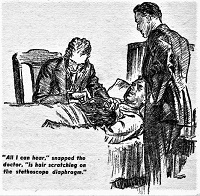
"Hyperpilosity" is a science fiction story by American writer L. Sprague de Camp. It was first published in the magazine Astounding Stories for April, 1938, and first appeared in book form in the de Camp collection The Wheels of If and Other Science Fiction (Shasta, 1949; It later appeared in the anthologies Omnibus of Science Fiction, Science Fiction of the Thirties, The Edward De Bono Science Fiction Collection, and The Road to Science Fiction #2: From Wells to Heinlein, as well as the magazine Fantastic Story Magazine and the de Camp collection The Best of L. Sprague de Camp. In 2014 the story was shortlisted for the Retro Hugo Award for Best Short Story.







